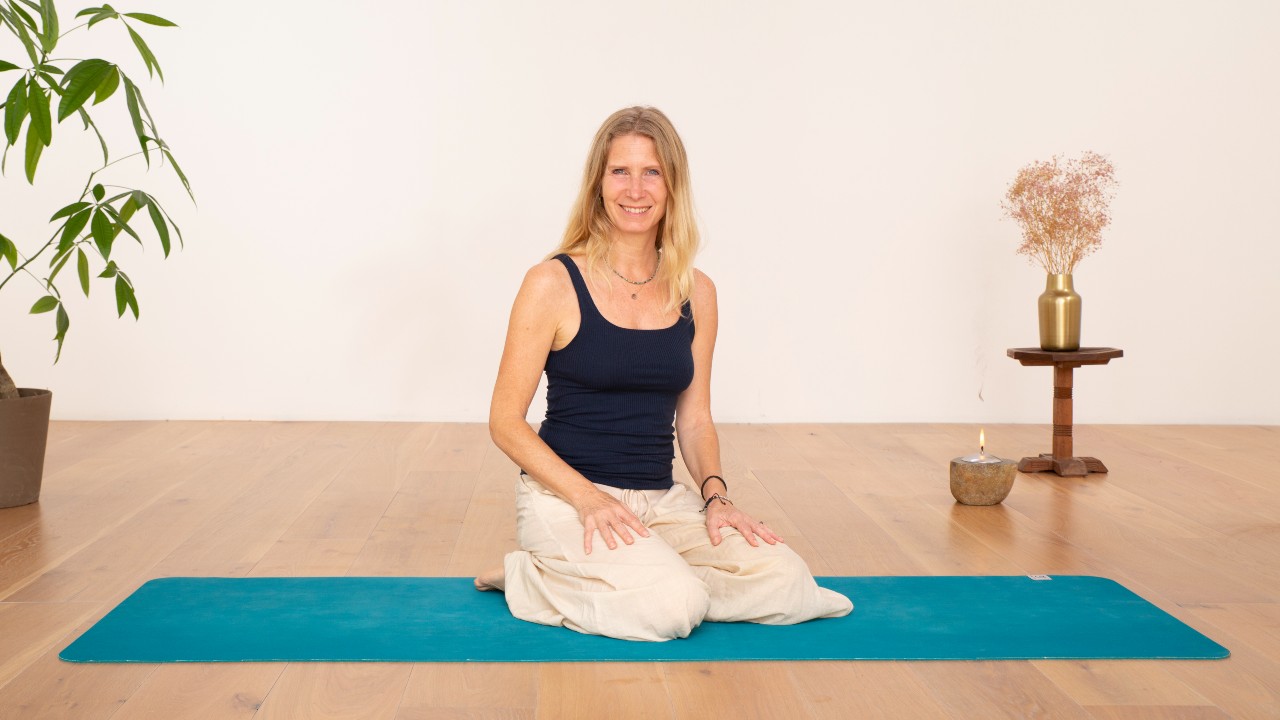Self-compassion has been a beautiful and transformative practice for me. It regulates my nervous system, broadens my perspective, and completely changes how I view the world and myself. Practicing self-compassion brings me a sense of inner peace, resilience, softness, and kindness that I hadn’t experienced before. I’d love to share some impactful ways to practice self-compassion with you.
Before we dive into the core concepts, let’s begin with some gentle movements to open your body and heart. This simple act of self-kindness will enhance your experience and help you fully absorb the teachings that follow. Take a few minutes to try this exercise and prepare yourself for the journey ahead.
Quick practice: Cultivate self-kindness through stretching
Stretch and squeeze:
- Inhale deeply and squeeze your whole body tight, including your face.
- Exhale and release, letting go of any tension.
- Repeat this a couple of times, adding wrist rolls to loosen up.
Gentle rocking and yawning:
- Rock your body gently to tune into your physical presence.
- Allow yourself to yawn naturally, releasing any remaining tension.
Seated Cat-Cows:
- Perform seated cat-cow stretches or move onto all fours if preferred.
- Interlace your fingers behind your head, lift your heart, and let your head rest back into your hands.
- Breathe deeply, opening your chest and gently moving your eyes side to side.
This brief practice helps us embody kindness and prepare for a deeper exploration of self-compassion. Now, we’ll delve into the heart of our discussion and explore how we can transform self-judgment into self-compassion.
Transforming self-judgment into self-compassion
Recognise and accept emotions:
Imagine someone you deeply care about saying to you, “You are perfect just as you are. You don’t need to change or be different. I love you completely, and you have the freedom to be yourself.” Reflect on how this makes you feel, likely bringing a sense of relief, warmth, and openness. Extend this same compassion to yourself by saying these words from a place of wisdom and love. Notice how it feels to give yourself this unconditional acceptance. You may feel a release of tension, a softening of the heart, and an overall sense of being seen and valued just as you are. This practice can serve as a powerful reminder that you deserve the same kindness and understanding that you readily offer to others.
Welcome and process emotions:
When you feel self-critical or judgmental, recognize these emotions without judgment. See them as messengers providing insight into your inner state. By acknowledging these feelings instead of pushing them away, you create a safe space for them to be processed. This acceptance allows your emotions to move through you, leading to emotional integration and healing. Think of it as giving these emotions permission to exist, which can reduce their intensity and help you understand the underlying needs or fears they represent. This process can lead to greater self-awareness and a more compassionate relationship with yourself.
Transform negative self-talk:
Replace negative self-talk with compassionate and kind words. For example, instead of saying, “That was stupid,” say, “It’s okay. I’m learning and growing.” This shift in dialogue can help you nurture a more positive inner voice. Consider how you would speak to a friend who made a mistake—offer yourself the same level of kindness and support. This practice helps to rewire your brain, making compassionate self-talk a more natural response over time. The more you practice this, the more your inner dialogue will reflect love and encouragement, fostering a healthier and more resilient mindset.
Embrace all parts of yourself:
Understand that all parts of you, including the personas you present to the world, are there to protect you. Embrace and love them without judgment. By doing so, you create a space where all aspects of yourself are acknowledged and valued. Recognize that these different facets of your personality have developed as coping mechanisms or ways to navigate the world. By accepting and integrating them, you move towards wholeness. This acceptance can dissolve internal conflicts and lead to a more harmonious inner life. It’s about honoring every part of your journey and understanding that each aspect of you has contributed to your growth and survival.
Practice: The root of peace is acceptance
True acceptance means fully allowing what life is. This class helps us to access a heart space where everything that is, is welcome, without judgement. The class starts with a poem, then we move to open the body and soothe the mind. In between we ask ourselves the questions: “What is going on inside of us?” and “Can we be with it?” Expect some shaking, Qigong, some Cat/Cow and mobilising the upper body and hips, some gentle heart openers, a settling forward bend and a nice twist.
Reflection exercise:
Reflect on areas of your life where you feel most critical or judgmental. Consider the following questions:
- Which areas of your life do you feel the most critical or judgmental about?
- What small steps can you take to be kinder to yourself in these areas?
By identifying specific actions or changes in perspective, you can start to shift from self-judgment to self-compassion.
Embracing self-compassion is not just about treating ourselves with kindness but also about transforming the way we interact with our emotions and thoughts. By recognizing and accepting our emotions, transforming negative self-talk, and embracing all parts of ourselves, we create a foundation for a more compassionate and fulfilling life.
Join my monthly Zoom gatherings
For those interested in diving deeper into these practices, I host monthly gatherings where we explore themes like these in greater detail. My next session is on August 31st at 16:00 CET, and we will be focusing on “Harnessing the Power of Your Mind: Reframing Negative Beliefs and Communicating with Your Brain.” Click here to join me to continue this journey of growth and self-discovery.


